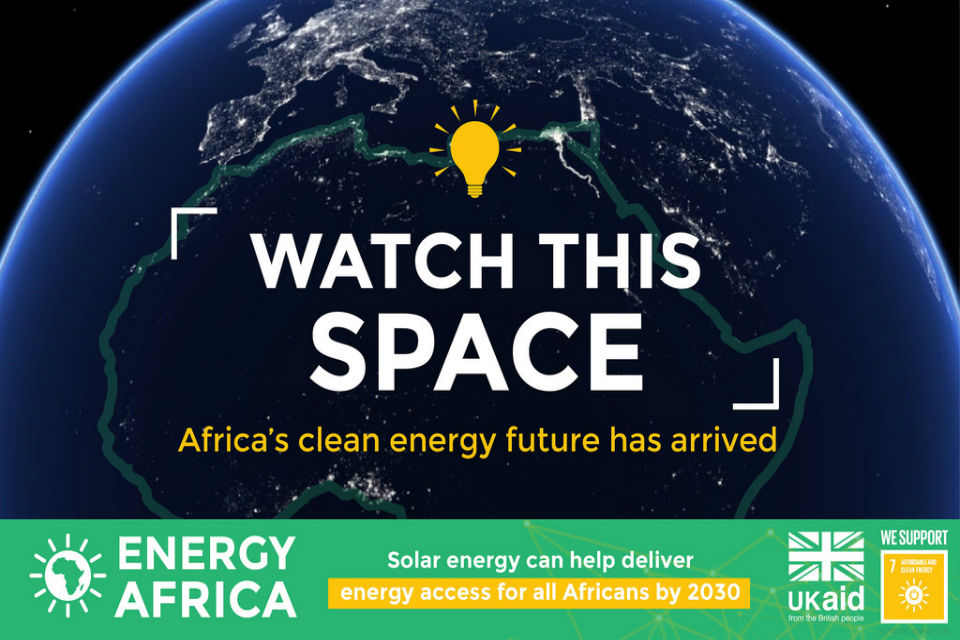Time to kick-start a solar revolution across Ghana
UK Minister of State for International Development, Rt Hon Grant Shapps' opinion about his visit to Ghana.

Ghanaians pay much more for their electricity - to charge their phone, for example - than someone in the UK will pay. Meanwhile power outages cost African countries 1-2% of their annual GDP, stifling economic growth.
Around 600 million people in Africa – two out of three – are locked into poverty because they do not have electricity. This is a shocking statistic which shows we must act now to kick-start a solar revolution across Africa.
On my first visit to Ghana as Minister of State at the UK Department for International Development, I look forward to meeting companies who are bringing energy into people’s homes and customers whose lives are being transformed by solar technology.
The benefits of change could not be clearer and the impact could be huge. And with the latest technologies and business models, it can largely be delivered by the market. Demand for energy in Ghana represents a real opportunity for global investors - a number of whom I met in New York last month.
The time to invest in a solar revolution in Ghana is now. The price of solar photovoltaic panels has plummeted in recent years, battery technology has radically improved and electrical appliances have become more energy efficient. Added to this, the spread of mobile payment systems means people can pay for electricity on a micro pay-as-you-go basis, for less than they already spend on kerosene. This in turn means a market can be converted to deliver large scale off-grid domestic solar power.
And the time to act is now. On current projections, universal access to energy will not be achieved until 2080, and we know the grid will only ever provide 40% of Africa’s energy needs. So we have to look elsewhere too.
Off-grid solar presents a solution today. Clean and affordable technology, pioneered by British companies such as Azuri and MKOPA already offers households immediate energy access. With $100 billion (£64 billion) a year spend on dirty kerosene and charcoal alternatives, this is a market opportunity and one that is growing. Last year the market turnover was $300 million.
On Wednesday I will visit customers of Persistent Energy Ghana (PEG) in the Volta Region to hear directly from them how solar home technology is transforming people’s lives.
The UK government has already provided seed capital to stimulate private investment in Ghana since 2010 through programmes such as ‘Mobile for Development’ and Africa Enterprise Challenge Funds. But together, we can do more.
This means cutting red tape, reducing regulatory barriers and improving access to finance to create the conditions for more investment in solar energy in Ghana.
Earlier this month, I met with investors, including Sir Richard Branson, whose company Virgin Unite is exploring investment in Africa, and Seth Merrin, of investment group Liquidnet, to better understand how we can work with potential investors. This collaborative approach has helped shape the Energy Africa campaign and its goals, and reaffirms that the time to act is now.
Against the backdrop of the UK’s commitment to the new Global Goals, including Goal 7 on ensuring access to affordable, reliable, sustainable and modern energy for all, we are using Britain’s ingenuity to make the sector work in a smarter way to bring energy to millions of people in Ghana and in Africa
The launch of the campaign in London last month brought together African governments, funders and financiers, businesses and solar experts to kick-start this work, alongside prominent Ghanaian and former UN Secretary General Kofi Annan and the activist Sir Bob Geldof. Together we can create the basis for household solar market expansion and make a real difference to the lives of people in Ghana.
Grant Shapps MP is Minister of State at the Department of International Development in the UK government.